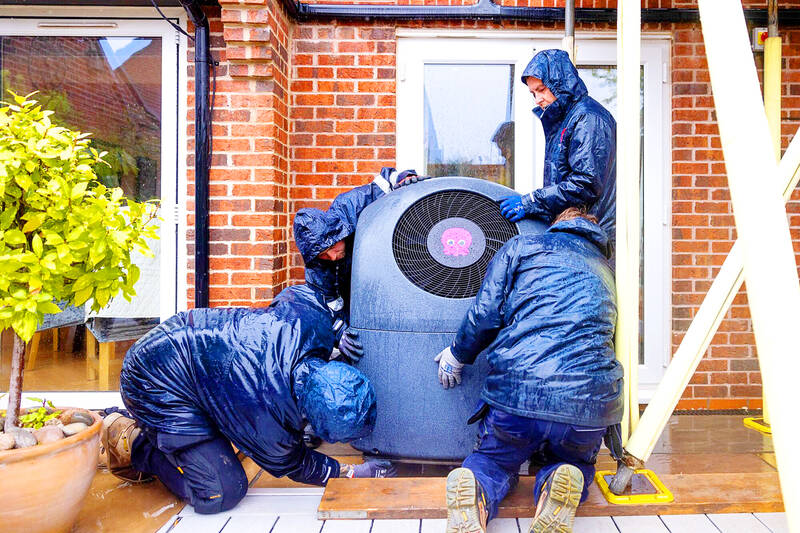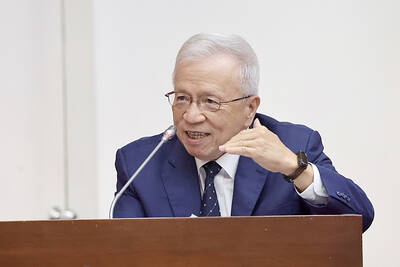When David Tester, 56, installed a heat pump in his home in the winter of 2022, freezing temperatures descended on the UK alongside a series of named storms. It was a world away from this summer’s heatwaves, which have pushed the UK to the brink of drought.
However, Tester’s choice of heat pump design has meant that his three-bedroom 1930s semi in West Sussex, southern England, has remained at a comfortable temperature despite the UK’s increasingly volatile weather. The air-to-air heat pump provides heating in the winter, but acts like an air conditioner in the summer months.
“The heat pump has worked very well in both seasons, and because I run it on electricity from my solar panels, it basically provides cooling for free,” he said.

Photo: Bloomberg
Heat pumps remain rare in the UK, but the recent spells of hotter-than-average temperatures might have the unexpected consequence of boosting the government’s ambition to replace the nation’s boilers.
The government recently set out plans to include air-to-air heat pumps, which can act as air conditioners, in the same grant scheme that offers £7,500 (US$10,087) to households that replace their gas boiler with “wet system” heat pumps.
So far, the government has prioritized promoting “hydronic” heat pumps, in large part because they make use of the existing central heating pipes and radiators, which most households currently use to warm their homes.
They work like a fridge in reverse by using electricity to capture and amplify even small amounts of heat outside a home to raise the water temperature of the central heating system. The warmed water travels through pipes and radiators to heat a home in the same way as water heated by a gas boiler.
In the UK, air-to-air heat pumps are already beginning to roll out across public buildings, offices and shopping centres. Andrew Sissons, a deputy director at Nesta, a charity that researches home heating innovation, said that smaller homes and flats in particular could soon benefit from combined heating and cooling too.
Air heat pumps use the same basic principles as hydronic system heat pumps, but instead of heating water that is pumped through the home, they heat the air. In the summer, a refrigerant is used to provide cooling.
“Demand for air-to-air heat pumps could be significant,” he said. “They provide cooling, which is more in demand as our summers get hotter, and the cost of units is far lower too. They are also relatively simple to install because they are usually wall-mounted, so they don’t require as much outdoor space.”
The catch? They do not usually provide hot water, meaning a separate low-carbon solution would be needed to replace a traditional gas boiler system entirely.
In West Sussex, Tester has kept his gas boiler to heat the water used in his underfloor heating system on the first floor — but uses it sparingly for a few hours in the morning and evening during the winter months, while the air-to-air heat pump tackles the majority of the heating requirements. In summer, the pump runs on solar power to provide cooling.
The promise of cooler home temperatures through the UK’s increasingly warm summers does not sit easily with many. Home air conditioning is rare in the UK, unlike in southern Europe, and there are growing concerns over the impact of cooling on the UK’s energy demand and carbon targets as the climate crisis intensifies.
The International Energy Agency has said that growing demand for cooling could put a strain on electricity grids and climate goals. Cooling accounts for about 10 percent of global electricity demand, but it is set to double by 2050 as the climate gets hotter.
The global energy watchdog said that in 2023 one power plant in China burned about 800 tonnes of coal in just one hour to help keep Shanghai residents cool during a summer heatwave.
However, the British households should have no reservations about installing an air-to-air heat pump to use for cooling purposes too, Sissons said.
There are two main reasons for this: First, the number of days when cooling would be required is far lower than the number of days when the heat pump would make significant carbon savings by providing warmth in place of a gas boiler. These carbon savings would easily outweigh the extra carbon demand from cooling a home in summer, he said, not least because the UK’s electricity grid is increasingly green.
Second, there is a strong correlation between the days when cooling will be in high demand and the days when the UK is generating large amounts of solar power, Sissons said.
Winter evenings are still likely to be the most taxing for the UK electricity system, even if there is a significant uptake in summer air conditioning in the years ahead.
These calculations already form part of the extensive forecasts produced by the British National Energy System Operator to determine how much energy the UK would need in the future — and how it can meet this requirement.
The system operator’s modelling accounts for a huge increase in electricity use by the end of the decade, including demand from electric vehicles, heat pumps and data centers. It also forecasts more energy-efficient buildings and appliances combined with batteries, which can provide extra electricity at times of peak demand.
The modelling shows that a virtually zero-carbon electricity grid could power the UK by the end of the decade — even with growing demand — and be used by the industry and government policymakers to help the UK achieve its clean power goals.
Even so, homes can take steps to dull the effect of a surge in demand for cooling. The Energy Saving Trust recommends using passive cooling methods before fitting either an air conditioning unit or a heat pump with a cooling function to dampen the impact of higher energy demand.
These include using window shades and improving ventilation to minimize the amount of energy used to cool a home.

JITTERS: Nexperia has a 20 percent market share for chips powering simpler features such as window controls, and changing supply chains could take years European carmakers are looking into ways to scratch components made with parts from China, spooked by deepening geopolitical spats playing out through chipmaker Nexperia BV and Beijing’s export controls on rare earths. To protect operations from trade ructions, several automakers are pushing major suppliers to find permanent alternatives to Chinese semiconductors, people familiar with the matter said. The industry is considering broader changes to its supply chain to adapt to shifting geopolitics, Europe’s main suppliers lobby CLEPA head Matthias Zink said. “We had some indications already — questions like: ‘How can you supply me without this dependency on China?’” Zink, who also

At least US$50 million for the freedom of an Emirati sheikh: That is the king’s ransom paid two weeks ago to militants linked to al-Qaeda who are pushing to topple the Malian government and impose Islamic law. Alongside a crippling fuel blockade, the Group for the Support of Islam and Muslims (JNIM) has made kidnapping wealthy foreigners for a ransom a pillar of its strategy of “economic jihad.” Its goal: Oust the junta, which has struggled to contain Mali’s decade-long insurgency since taking power following back-to-back coups in 2020 and 2021, by scaring away investors and paralyzing the west African country’s economy.

BUST FEARS: While a KMT legislator asked if an AI bubble could affect Taiwan, the DGBAS minister said the sector appears on track to continue growing The local property market has cooled down moderately following a series of credit control measures designed to contain speculation, the central bank said yesterday, while remaining tight-lipped about potential rule relaxations. Lawmakers in a meeting of the legislature’s Finance Committee voiced concerns to central bank officials that the credit control measures have adversely affected the government’s tax income and small and medium-sized property developers, with limited positive effects. Housing prices have been climbing since 2016, even when the central bank imposed its first set of control measures in 2020, Chinese Nationalist Party (KMT) Legislator Lo Ting-wei (羅廷瑋) said. “Since the second half of

AI BOOST: Next year, the cloud and networking product business is expected to remain a key revenue pillar for the company, Hon Hai chairman Young Liu said Manufacturing giant Hon Hai Precision Industry Co (鴻海精密) yesterday posted its best third-quarter profit in the company’s history, backed by strong demand for artificial intelligence (AI) servers. Net profit expanded 17 percent annually to NT$57.67 billion (US$1.86 billion) from NT$44.36 billion, the company said. On a quarterly basis, net profit soared 30 percent from NT$44.36 billion, it said. Hon Hai, which is Apple Inc’s primary iPhone assembler and makes servers powered by Nvidia Corp’s AI accelerators, said earnings per share expanded to NT$4.15 from NT$3.55 a year earlier and NT$3.19 in the second quarter. Gross margin improved to 6.35 percent,